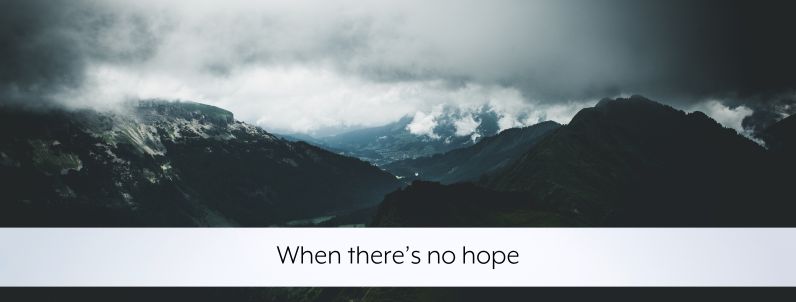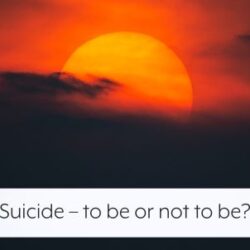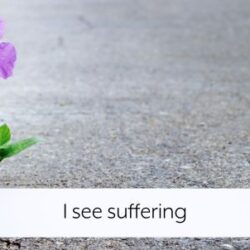
I remember back then too well: it was dark, and empty, and I was lost, and all around me were walls, and all within me was pain, and I was sat there in despair, just dying.
I remember the hopelessness too well. Like the air had been sucked from my lungs. Like the strength had been sucked from my bones. No energy left to hope. Just tick-tick-ticking the moments away, waiting for it all to be over.
It’s a grim place to be. I’m glad to say I’m not there any more.
A big part of who I am now, what I do, and what I write about is hope. And the internet is full of mummy-bloggers, tweeters and memers telling us that hope is coming, to believe in ourselves, that the best is yet to come. And sometimes I gag on it, because it’s all so prissy and woolly and cheap.
Real hope isn’t cheap. Real hope is born out of a bloody struggle. You can’t slap it on someone – ‘It’ll all be fine!’ – and then walk away. That’s not how hope is birthed. Hope has guts. Hope is what you’re left with when you’ve stared down the despair.
I believe in hope, because I’ve believed in hopelessness. Over a period of around 4 years or so, I couldn’t grasp why on earth I’d want to live until the end of the day. It was a period of such devastating emptiness, such pain, such torment. I would stare hopelessness in the face, and it would win every time.
So what changed? How did I get from hopelessness to hope?
It’s not because anyone rescued me – came in and made it all better. It’s not that anything magical happened. I think it’s because I couldn’t bear the hopelessness any longer.
Which sounds odd. Because the usual response to that is to commit suicide: when things get too much, you end it. And many times I was tempted, and many times I tried.
But it’s not enough. It’s frustratingly flaccid as a response. Maybe there was too much anger burning in me, at the injustice of it all, and killing myself wouldn’t have let me put things right, make a difference, or get revenge.
Whatever it was, I just got fed up with the hopelessness of it all. So fed up that I was willing to do something about it. Sometimes I think our problem is not that we’re hopeless; it’s that we’re not hopeless enough. Because we have enough hope to keep on hoping that something will just change, by itself, magically. We have a glimmer of hope that says that if we just wait this thing out, it will get better.
I got to the point where I truly believed in hopelessness, in despair. I truly believed that it wasn’t going to get any better.
And maybe you can only really believe in hope when you’ve really believed in hopelessness.
Once I fully believed that I was hopeless, I knew I had to do something about it. Kill myself or heal myself – one of either option, but not remaining sat still, frozen. I had to act.
Normally we think we need the hope first, before we’ll be willing to act. Or we worry that we won’t know which particular action is going to be successful. But looking back, I realise that it was the act of acting that was effective. It was the stirring myself, taking charge of myself, and deciding to move forwards. Even without any hope that by doing so things would get better.
And then strangely, by acting, the hope came. In droplets, one at a time. I began to hope. Not because my circumstances seemed any different, but because I seemed different.
I realised that my hopelessness was a symptom of trauma, my brain’s way of saying, ‘Don’t move.’ It was keeping me safe by keeping me still. ‘Don’t hope,’ it said. ‘Don’t act. Don’t move. Keep still.’
To break out of it, I just had to act. To do something to change my life. Small steps, small changes, to my routine: today I’m going to get out of bed. Today I’m going to make the bed. Today I’m going to get dressed. Today I’m going to read for five minutes. Today I’m going to go for a walk.
When we’re hopeless, we don’t bother trying anything new, because we’re convinced that it won’t work. We’re convinced that inaction is better than action. We’re convinced that there is nothing at all we can do to change our circumstances, so we have to stay still and do nothing and wait for things to change by themselves.
But hope comes when we start to move. When we start to act. When we start to take steps – any steps – to make things better for ourselves.
I broke out of hopelessness only when I realised that nothing was going to change unless I changed – when I really, truly, became hopeless. I broke out of hopelessness by realising that it was a survival strategy, of giving up and staying still, but that it had outgrown its usefulness. I broke out of hopelessness when I decided to act before I had any hope that those acts would be effective.
Are you feeling hopeless? If so, how hopeless? A bit hopeless, so you’re still clinging to the hope that things will change by themselves? Or have you reached rock bottom yet, where you are truly and terribly hopeless and know that you have to change things? What steps can you begin to change, to create hope for yourself?



10 Comments
Whilst hopelessness is an abyss it is can be so much less painful than hope.
Like you, I have navigated large patches of hopelessness and find myself currently on some solid ground of hope (knowing full well that other quicksand patches of deep hopelessness may yet be in my path). But I often thought about the line in the film ‘Clockwise’. I very stressed John Cleese (playing the Head Master Brian Stimpson) said this:
“It’s not the despair… I can take the despair. It’s the hope I can’t stand.” There is something in this – at times the pain of contemplating ‘hope’ is too harsh to bare. Because with hope there is risk, and until we have enough about us, we cannot risk hope. When we are able to begin to take the risk of action – holding hope at a distance, then change happens.
Very well said. Perfectly how it is.
I wish I could communicate that to a hopeless client. Who is so frozen that they don’t even know they have been traumatised. This is “brief therapy” and I know there is nothing I can do but I would so much like to leave them with an inkling of an idea that finding long-term therapy might at least possibly be worth bothering with.
Thank you for this post that is so honest and explains well the rawness and utter gut-wrenching stuff of hopelessness and the sheer guts it takes to take action. I too found the small things helped…a cup of tea, a soft blanket, sitting outside by a tree. Just to make the bed…I get that. Thanks for the way you tell it like it is, by being so honest, the way you then explain how you broke out of hopelessness is powerful.
Every article you write Carolyn Spring…. I relate to. I have never (at 58 years old) been able to articulate what happened and how I had been changed. When my 3 adult kids abandoned me 3 years ago I felt that the one thing I could have never contemplated dealing with … had happened. Abusive childhood, abusive ex-husband – now this. The ROOTS of it all in my childhood…. memories now at an older age come back to me. Me as that very very little girl, so lost… looking for someone to help. Bullies surrounded me – of every type. The softer hearted or “needier” I was as this little girl – the more they enjoyed killing the hope. Thank you so much for your articles and what you do. I have tried to find a good therapist on and off for many years, but it has never happened. I think a good therapist is someone who’s been through it – and you have. Thank you.
I really hope you’ll keep looking for the right therapist for you, Wendy. They are out there, and you deserve to find them. You deserve an empathic witness to walk alongside while you examine your past, present and future. I wish you all the very best.
How can you have hope if you have lived with depression all your life and you have a disability that stops you from participating in the world at large.
I am a Survivor.
For me I just exist.
Help costs money and I my case I need long term help. So you can see that is a problem here. I have to pay for the wrongs other people inflicted upon me.
We actively, intentionally avoid hope. For us, hope takes courage, courage we don’t have the heart for anymore. Far safer to accept despair than be exposed to disappointment. Your post, however, causes us to consider if perhaps there could be hope for hope. An interesting idea… Thank you for writing this.
Impossible to find hope when you desperately, desperately need counselling but your history of ritual abuse, mother-daughter sexual abuse and poly DID leaves you living on a disability pension and thus far below the Canadian poverty line. Life’s horrors left me too sick to work, too sick to work left me too poor to get help. Fucking catch-22. I’m tired of living with no chance of getting better.
i understand that there is no one who can save me; and that I have to save myself, and I dont know how.
how do i fix myself?
no family so wont bother